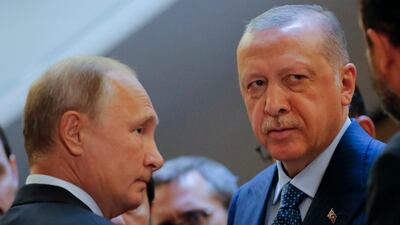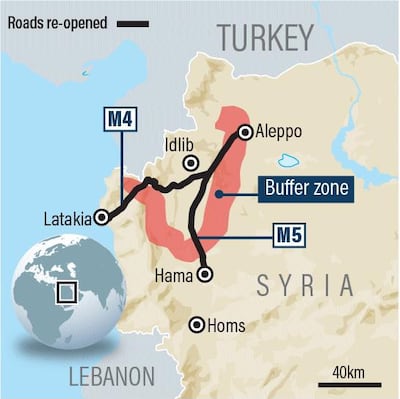Details of the agreement between Turkey and Russia on a demilitarised zone in the rebel-held northwestern province of Idlib, seen by The National, reveal a substantial victory for Damascus, even though it stalled a planned ground offensive there.
The announcement of the deal had at first appeared to deal a major blow to the Syrian government’s designs on the province. After weeks of building up forces around the edges and promising an attack, the Syrian army’s operation was nixed.
But the deal hammered out between Ankara and Moscow stipulates that two strategic highways running through the province be reopened to traffic by the end of the year, achieving a major aim of the planned government offensive without a shot being fired.
The M4 and M5 highways run from Latakia to Saraqib, and from Syria’s southern tip to the border with Turkey in the north – both have been cut off in Idlib since 2014.
Before the war, the M5 highway was a major trade route that connected the commercial hub of Aleppo to Damascus and on to the Jordanian border. The recapture of the two highways was seen as a likely first phase to a wider government assault on Idlib.
Reopening them would help resume trade between neighbouring Turkey and regime-held areas. The agreement says these steps are a way “to ensuring free movement of local residents and goods and restoring trade and economic relations”.
“Idlib is strategically relevant less as Idlib itself than as a crossroads between other more politically and economically significant provinces and as a gateway to Turkey,” said Sam Heller, a senior analyst at Crisis Group.
“For Damascus, reopening these roads is relevant economically as it attempts to reintegrate Syria economically and position itself for postwar reconstruction, and it has symbolic political value as another step towards a unified, state-controlled Syria,” he added.
But, while the agreement had some good news for Damascus, many in Idlib are already seeing the benefits. The pause has allowed some breathing space for the nearly three million people who live there, after weeks of living in fear of attack.
______________
Read more:
Russia and Turkey agree to create buffer zone in Syria's Idlib
Israel to blame after Syrian ally shoots down Russian plane says defence minister
Analysis: Idlib deal greeted by relief and caution
______________
Thousands of people who had fled air strikes and the threat of a ground assault have returned to their homes in southern Idlib, according to the UK-based Syrian Observatory for Human Rights.
"Around 7,000 people have returned to their towns and villages since the announcement of the deal on Monday, especially in the southeast of Idlib and the north of Hama," Rami Abdel Rahman, head of the Observatory, told AFP.
Around 40,000 people had fled those areas in the first two weeks of September, as Russia launched airstrikes and Syrian artillery pounded positions in Idlib. Some had returned home earlier, many others are now following.
In the wake of those initial attacks, the United Nations warned that a wider offensive could cause the “worst humanitarian crisis of the 21st century,” sparking intense diplomacy between Turkey and Russia, and leading eventually to an agreement.
The deal provoked mixed emotions in Idlib. Reacting to the news on Monday night, Abdulkafi Alhamdo, a 32-year-old teacher living in the province’s eastern countryside, told The National he hoped the deal would save lives but, even if they survived, many would remain estranged from their homes.
“People might be able to live again. Children might know there is tomorrow without planes. But we are still in nowhere. Refugees forever,” he said.
Turkey, which has a significant military presence in Idlib and backs a number of rebel groups there, is desperate to avoid a conflict that would send another wave of refugees to its borders.
Ankara now faces the daunting task of tackling extremist groups operating in Idlib – something it has had little success with so far. The extremist Hayat Tahrir Al Sham, a former Al Qaeda-affiliate that controls around two thirds of the province, has spoken out against the deal, and may have an interest in spoiling it.
As news of the deal broke on Monday, events not far from Idlib served as a reminder that the Syrian civil war is now an international conflict.
An Israeli missile attack against a Syrian government target in Latakia sparked a friendly-fire incident that saw Syrian air defences shoot down a Russian jet. The incident sparked a short-lived diplomatic crisis between Israel and Russia, which leaders from both countries have since tried to calm.
US officials confirmed on Tuesday that the Israeli attack struck “a facility that Iran was using to house sensitive military equipment” that it would later transfer to Hezbollah in Lebanon.
The US narrative matches with that presented by Israel where Prime Minister Benjamin Netanyahu, who said that his fighter jets “targeted a facility from which systems to manufacture accurate and lethal weapons were about to be transferred on behalf of Iran to Hezbollah in Lebanon”.
At the White House and the State Department, the focus was on the downing of the Russian aircraft near Latakia. US President Donald Trump called it a “very sad thing” and “not a good situation”.
Mr Trump blamed the Syrian government for the incident. ”It sounds to me and it seems to me, based on a review of the facts, that Syria shot down a Russian plane,” he said. “And I understand about 14 people were killed and that’s a very sad thing but that’s what happens.”


